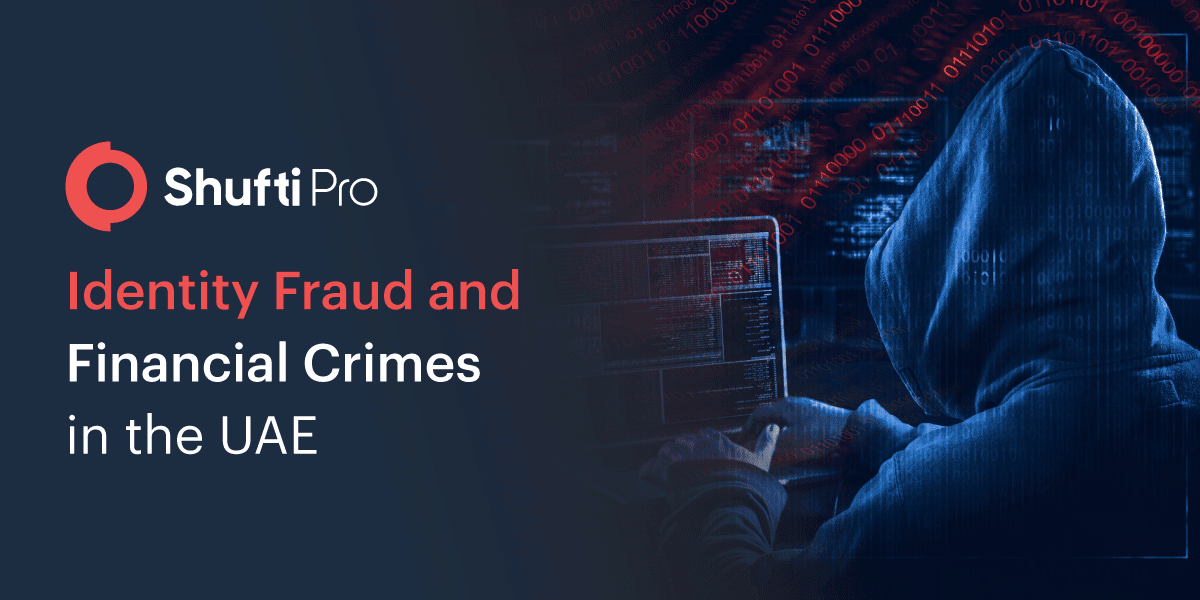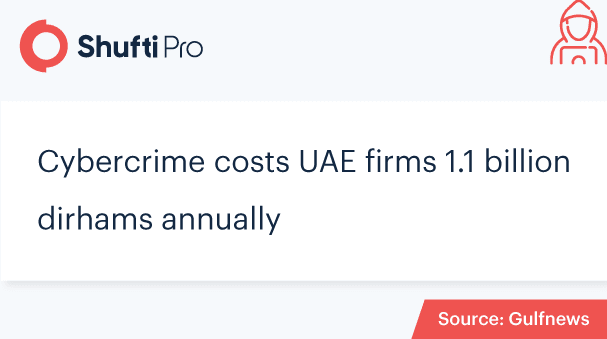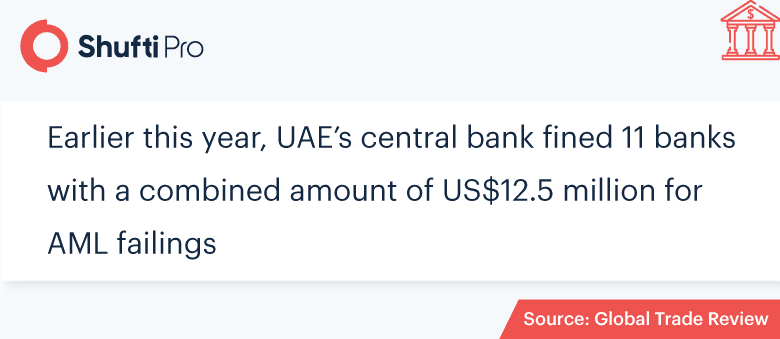UAE Government Stepping Up Against Prevalent Crimes

The UAE is known for being home to flourishing businesses and providing a significant level of financial secrecy. A total of 22 local and 30 foreign banks in the country means that the potential risk for money laundering and terrorist financing is much higher.
According to the Central Bank of UAE, the COVID-19 pandemic not only shook the financial system but also gave way to a rise in the instances of cyberattacks, fraud, and money laundering across the country. Among the common crimes, the pandemic also opened doors for money laundering through e-commerce and cryptocurrencies, COVID-related scams, and corporate fraud.
Concerns of Financial Crime for UAE’s Firms
Banks and financial institutions can become the targets of cyberattacks, identity fraud, and money laundering if preventive measures are not implemented. Most firms in the UAE are seen to focus on the obvious ways that criminals may adopt to obscure the origins of their funds or manipulate an employee’s identity. However, as the scope of financial crime is getting wider with the use of sophisticated technology, companies must also incorporate robust KYC/AML solutions to combat these crimes.
Although the UAE demonstrates continuous efforts against money laundering and confiscates the proceeds of domestic crime, there are still improvements required in the investigations related to money laundering in high-risk sectors such as money exchanges, antiquities, and precious metals. As a result, the UAE government is ramping up its efforts against money laundering and terrorist financing. In October this year, fines were issued to seven legal companies along with prison sentences against 20 defendants. The total amount retrieved was more than AED 22.6 million, while the fines crossed AED 60 million. His Excellency Faisal bin Sulaitin, Executive Director of Dubai Economic Security Centre, said, “Protecting Dubai’s economy from economic crimes enhances the confidence of global investors and major international financial institutions in its secure environment.”

DPMS (Dealers in Precious Metals and Stones)
Despite the UAE’s obligation to report dealings of precious metals and stones, there have been reports of money being laundered through this sector. Apparently, there is a lack of consistency on part of the UAE authorities regarding the investigations in these areas, and even though penalties are applied, the falsification of information regarding DPMS continues. Based on the key observations in the UAE FATF Mutual Evaluation Report 2020, the UAE may initiate efforts to assess financial crime risks and implement AML solutions to detect the sources of funds and also monitor cross-border movements of precious metals and stones.
Real Estate Firms
The UAE’s real estate sector faces risks of money laundering as most of the funds are from foreign investors. As these cash-based purchases are often made with funds sourced from high-risk jurisdictions, the usual due diligence procedures are not sufficient to detect criminals from sanction lists. In order to carry out background screening and get detailed insights into the sources of funds, UAE’s real estate firms need to incorporate enhanced due diligence measures. Monitoring real estate transactions will enable the country’s financial system to know about both the purchasing party and where the money comes from, hence reducing the risks of money laundering. In addition to the due diligence processes, real estate agencies, land registration bodies, and other relevant firms must be trained to effectively combat financial crime.
Currency Exchanges
The UAE being a cash-intensive economy with vast networks of currency exchanges and tourism-based companies inherits the risks of financial crime. A large number of cash transactions in money exchanges give way to money laundering and terrorist financing activities, making it the most vulnerable sector in the UAE’s National Risk Assessment (NRA). Although the money exchange sector demonstrated sufficient risk analysis and prevention capabilities during the MER, a large number of licensed currency exchanges in the country (130) means the measures vary from company to company. Most of these currency exchanges are small businesses and do not generate enough revenue to incorporate robust transaction monitoring systems. In order to combat financial crime, there need to be effective measures to determine the sources of the money that is being brought to the currency exchanges and analyze the risk that each individual possesses.

UAE’s Efforts to Combat Financial Crime
UAE authorities are now taking steps to strengthen the defense mechanism against money laundering and terrorist financing. In order to fill in the gaps in their financial system, the UAE is increasing penalties for not only the criminal entities but the companies that, intentionally or unknowingly, become the sources of these crimes. The private sector, which is responsible for a significant portion of the country’s economy, is also implementing the necessary measures to prevent financial crimes.
Suggested Read: Video KYC – Answer to Digital Revolution in the Gulf Region & UAE
Moreover, banking regulators are carrying out surveys by selecting several financial institutions to monitor their activities to eliminate the risks of money laundering and terror financing. Identifying the direct risks and those derived from previous instances of money laundering, the regulators have highlighted them in the NRA. The Central Bank says that these risks are “likely to be prevalent across the wider financial sector”.
Eliminating financial crime is now the top priority in every company, as the financial regulators have actively directed their actions towards this purpose in the past few years. Businesses are being issued warnings for loopholes in their AML measures, and heavy penalties are in place for those that breach financial regulations.
New AML/CFT Trends
An AML (Anti-money laundering) department has been established by the UAE’s Ministry of Economy in order to monitor and ensure compliance with local AML/CFT laws. Furthermore, the UAE has also been making efforts to implement the recommendations of the Financial Action Task Force (FATF). With the adoption of face recognition technology, the UAE is improving its efforts towards compliance with anti-money laundering laws and regulations. In a tweet, His Highness Sheikh Mohammed bin Rashid Al Maktoum, Vice-President and Prime Minister of the UAE and Ruler of Dubai said that the Ministry of the Interior will incorporate face recognition to improve the process of identity verification.
Key Takeaways
With numerous internal free trade zones and a booming financial system, the UAE provides the ideal shadow for criminal entities to hide under. Although financial institutions in the country strive to incorporate measures to prevent money laundering and terror financing, crime still prevails. Shufti’s robust AML Screening solution enables financial institutions to run background checks against 1700+ global watchlists with a market-leading accuracy of 98.67%.
Want to learn more about AI-driven AML Screening solution for your business?

 Explore Now
Explore Now













